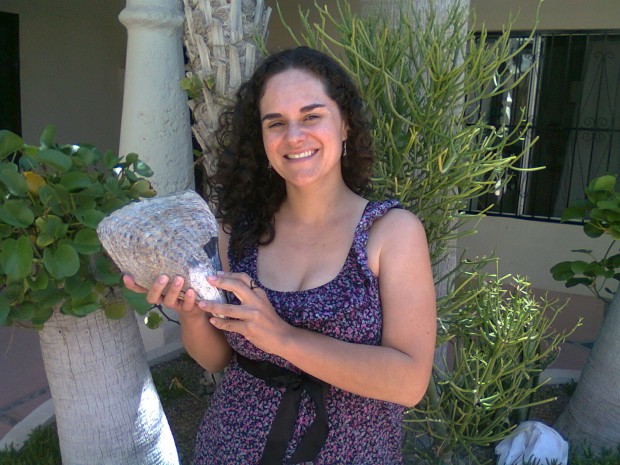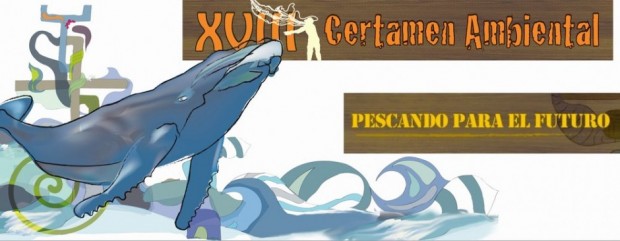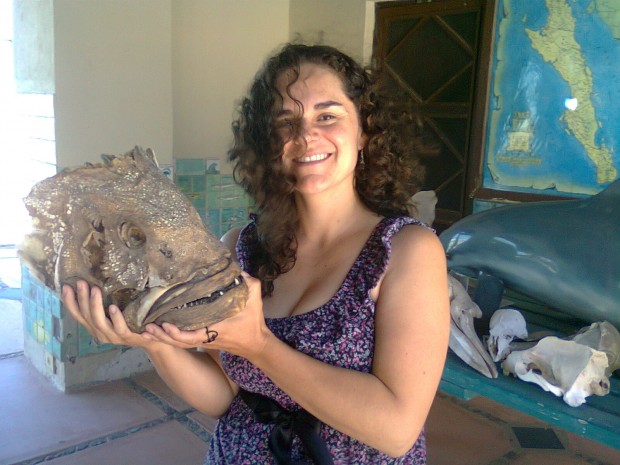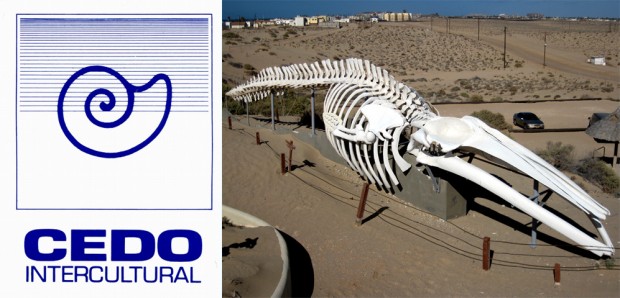To learn more about CEDO’s very interesting and widely publicized Environmental contest “Fishing for the Future,” I recently sat down with Paloma Valdivia, Coordinator of the Environmental Education Program at the Intercultural Center for the Study of Deserts and Oceans (CEDO). In fact, the judging panel is already in the process of selecting a winner, which will be announced this coming Saturday, June 2nd at an awards event and celebration (open to the public) from 11 a.m. – 2 p.m. at CEDO.
Despite the wind that blew outside the day we met, we found ourselves within the comfortable confines of CEDO’s small fortress like building atop a hill in Las Conchas with perfect views in the four cardinal directions. Paloma had come out to greet me and led me inside to a small library just to the left of the entrance, enveloped in an air of a vintage school library. We sat down to chat.
 Paloma explained CEDO has been organizing these environmental contests for 18 years, each year selecting a relevant theme with local impact. They have had contests focused on water, recycling, and the conservation of certain ecosystems (such as regional wetlands, reefs, migratory birds, etc.). However, this year is special as it is the only year they have repeated a theme (among other reasons explained below): Fishing. This is a fundamental topic that today involves both the environment as well as society, in addition to being one of the most important activities across the region. Puerto Peñasco itself, along with surrounding communities, exists precisely due to fishing activities.
Paloma explained CEDO has been organizing these environmental contests for 18 years, each year selecting a relevant theme with local impact. They have had contests focused on water, recycling, and the conservation of certain ecosystems (such as regional wetlands, reefs, migratory birds, etc.). However, this year is special as it is the only year they have repeated a theme (among other reasons explained below): Fishing. This is a fundamental topic that today involves both the environment as well as society, in addition to being one of the most important activities across the region. Puerto Peñasco itself, along with surrounding communities, exists precisely due to fishing activities.
“Therefore,” Palomas went on, “we want to rescue a bit of the historic importance that fishing has for us and for our areas, so that children and youth identify with this activity, making it theirs and seeing within it a sustainable future.”
This year, they extended the invitation for contest participants beyond Puerto Peñasco, from Puerto Lobos to San Felipe (Baja California), encompassing all coastal communities across the region. They visited nearly all secondary and high-schools, inviting them to participate. Thanks to this diligent work, they registered nearly 70 teams (made up of a maximum of 10 people each), which was another achievement for this year – making this contest that with the highest number of teams.
“Unfortunately, not all the teams turned in their final work,” she lamented, “which is something we’ll have to focus on next year – follow-up and being in constant contact with the team leaders so they don’t lose their drive or get discouraged so that those who register, continue and finish.” “At the same time,” she reflected, “we did have a number of people doing this and in contact with the teams; they were given training about the contest and we were in constant communication through Facebook and the Environmental Contest blog. So, those who did not turn in their work was because something happened or because they really didn’t want to.”
 It was then that Valdivia emphasized the importance of being a good leader or advisor, as a lot depends on the enthusiasm teachers provide for the project. Just as there is some apathy, there are also those who do their part. She smiled and told me that curiously a group came to them from Pitiquito, an area where contest organizers had not gone to present the project as it does not necessarily have much relationship with the sea and maritime activities. Nevertheless, a teacher who instructs in the small town of “Y” knew of the project and liked the idea so much he decided to take it to his students in Pitiquito. The group became excited with the topic, registered, and successfully completed their project! In thinking about all of the work spread across her desk, Valdivia expressed that “The work turned in is wonderful; all of the work is very interesting and everyone should see them.”
It was then that Valdivia emphasized the importance of being a good leader or advisor, as a lot depends on the enthusiasm teachers provide for the project. Just as there is some apathy, there are also those who do their part. She smiled and told me that curiously a group came to them from Pitiquito, an area where contest organizers had not gone to present the project as it does not necessarily have much relationship with the sea and maritime activities. Nevertheless, a teacher who instructs in the small town of “Y” knew of the project and liked the idea so much he decided to take it to his students in Pitiquito. The group became excited with the topic, registered, and successfully completed their project! In thinking about all of the work spread across her desk, Valdivia expressed that “The work turned in is wonderful; all of the work is very interesting and everyone should see them.”
The contest included three principal elements: first, each team conducted research on a fishery, investigating the species in which the fishery specializes, its biology, ecosystem, how fishing is done, when, how often, and even any respective legislation. This was complemented by interviews with fishermen. Once the research was complete, the idea was to specify a problem (or concentrate on one if there were various), giving priority to issues that do not allow these companies to be sustainable (cause and effect). As a final part, they sought a viable solution that may be implemented relatively easily.
“It is simple,” explained Paloma, “though we asked them to speak with fishermen and get the commitment that this solution be real and one that could be implemented or that they could do and/or adapt to. This contest promises a lot and involves people with a very strong past and present, with real issues; thanks to research done by the teams, we can get an idea of the magnitude of the situation as well as the commitment required to address it.”
Paloma noted there is a team that continues working on the estuaries (and has even become a Civil Association) in search of floating devices that are less aggressive to the environment.
The awards ceremony for CEDO’s Environmental Contest will be this Saturday, June 2nd at CEDO’s main facility in Las Conchas. Paloma extended an invitation to the general public to attend the event, to be held from 11 a.m. to 2 p.m. noting it promises to be quite an event! Taking advantage of having participants from all different areas on hand, they are going to have a tremendous celebration with cultural events, music, dance groups, and song. There will also be stands where participating teams will present their work; in addition, other organizations dedicated to conservation work in the region are also invited to present their proposals. In addition, they have invited fishermen groups that are fully dedicated to responsible fishing. All of this is to show youth there are people committed to conservation and the application of alternative methods, so they become excited to continue participating.
For more information, visit the contest’s Facebook page: Certamen Ambiental CEDO Or the site: http://www.cedointercultural.org/content/view/12/15/lang,es/
Certamen Ambiental CEDO otorgará premios este sábado 2 de junio
Con motivo del Certamen Ambiental Pescando para el futuro del CEDO platicamos con Paloma Valdivia (Coordinadora del Programa de Educación Ambiental del Centro Intercultural de Estudios de Desiertos y Océanos A.C.) para que nos adentrara un poco más sobre la idea de este interesante y ya muy sonado certamen, que para estos momentos el jurado ya está en la búsqueda del ganador que se dará a conocer el próximo dos de junio.
Aún con el viento tan alocado y la arena estrellándose en mi cara, pude apreciar lo que se me antojó como una especie de pequeña fortaleza. Desde una cumbre tienen perfecta vista a los cuatro puntos cardinales, y con el famoso esqueleto de ballena resguardando el lugar se me figuró como un pequeño santuario.
Ya subiendo los escalones del pórtico, Paloma salió a mi encuentro con una alegre sonrisa y unas grandes gafas para el sol de armazón blanco. Gracias al ventarrón me invitó a pasar a la pequeña biblioteca que está entrando a la izquierda, que tiene un aire cómodo de biblioteca escolar antigua. Tomamos asiento y empezó la charla.
 Paloma platicó que estos certámenes ambientales se organizan en CEDO desde hace ya 18 años, donde cada año se elige un tema de relevancia e impacto local. Han tenido certámenes enfocados en el agua, en el reciclaje, conservación de algunos ecosistemas particulares (como los humedales de la región, arrecifes rocosos, aves migratorias, etc.). Pero este es un año especial: es el único año que se ha repetido tema (entre otras innovaciones que más adelante me comentó): el de la pesca, pues es un tópico fundamental hoy en día que involucra tanto al medio ambiente como a la sociedad; aparte de ser una de las actividades más importantes en la región, pues es gracias a esta actividad que existe Puerto Peñasco y las comunidades aledañas.
Paloma platicó que estos certámenes ambientales se organizan en CEDO desde hace ya 18 años, donde cada año se elige un tema de relevancia e impacto local. Han tenido certámenes enfocados en el agua, en el reciclaje, conservación de algunos ecosistemas particulares (como los humedales de la región, arrecifes rocosos, aves migratorias, etc.). Pero este es un año especial: es el único año que se ha repetido tema (entre otras innovaciones que más adelante me comentó): el de la pesca, pues es un tópico fundamental hoy en día que involucra tanto al medio ambiente como a la sociedad; aparte de ser una de las actividades más importantes en la región, pues es gracias a esta actividad que existe Puerto Peñasco y las comunidades aledañas.
“Entonces,” dijo Paloma, “queremos rescatar un poquito esa importancia histórica que tiene la pesca para nosotros y para estos lugares, que los niños y jóvenes se identifiquen con esta actividad, que la hagan suya y que vean en ella un futuro sustentable.”
Este año también no nada más la convocatoria se hizo local, si no se extendió a nivel regional, pues desde Puerto Lobos hasta de San Felipe, pasando por todas las comunidades costeras de la región, visitando casi todos las secundarias y bachilleratos invitándolos a participar. Y fue gracias a esta ardua labor que tuvieron cerca de 70 equipos registrados (siendo los equipos de un máximo de 10 personas) otro de los logros de este año; haciendo de este certamen el de mayor número de equipos.
-Desafortunadamente no todos los equipos entregaron trabajo final- comentó tristemente Paloma- Eso si, tendrá que ser algo en lo que tendremos que enfocarnos el año que entra; darles seguimiento y estar en contacto constante con los líderes de los equipos, para que no pierdan la emoción y se desanimen, para que el que se registre continúe y termine. Aunque, por otro lado,- reflexionó- este año estuvimos bastante pendientes de eso. Tuvimos personas que estuvieron correteando y en contacto con los equipos, se les dio una capacitación sobre este certamen y estábamos en comunicación constante por medio de Facebook y del blog del Certamen Ambiental.
-Entonces- continuo- los que no entregaron fue por que algo les pasó o por que realmente ya no quisieron.-
Fue entonces cuando enfatizó en la importancia de un buen líder o asesor, ya que mucho recae en el entusiasmo que le impriman los maestros al proyecto, pues así como los hay un tanto apáticos, hay los que ponen todo de su parte. Y entonces con una sonrisa me contó que curiosamente les llegó un grupo de Pitiquito. Un lugar a donde ellos no habían ido a presentar el proyecto pues, al parecer, no tenía mucha relación con el mar y sus actividades, sin embargo un profesor que daba clases en la Y supo del concurso, y le gustó tanto la idea que también se las presentó a sus estudiantes en Pitiquito. Luego el grupo se entusiasmó con el tema y ¡listo! se inscribieron y terminaron su proyecto.
Recordó sobre los trabajos sobre su escritorio y dijo con agrado- De los que si entregaron se lee que están buenísimos, muy interesantes todos los trabajos; todos deberían de conocerlos.
 La dinámica de la convocatoria tiene tres elementos principales. Primero, cada equipo investigó una pesquería; investigaron sobre la especie -en que la pesquería se especializa-, biología, ecosistema, la manera en que se pesca, cuanto , cada cuanto, incluyendo en esta investigación, también un poco de legislación al respecto. Esto se complementa con entrevistas a los pescadores. Entonces una vez terminada la investigación la idea es de ubicar un problema (si es que hay varios se centran solo en uno), dándole prioridad a un problema que no permita que esas empresas sean sustentables (sus causas y efectos). Como parte final se le busca una solución viable y que pueda ser implementada con relativa facilidad.
La dinámica de la convocatoria tiene tres elementos principales. Primero, cada equipo investigó una pesquería; investigaron sobre la especie -en que la pesquería se especializa-, biología, ecosistema, la manera en que se pesca, cuanto , cada cuanto, incluyendo en esta investigación, también un poco de legislación al respecto. Esto se complementa con entrevistas a los pescadores. Entonces una vez terminada la investigación la idea es de ubicar un problema (si es que hay varios se centran solo en uno), dándole prioridad a un problema que no permita que esas empresas sean sustentables (sus causas y efectos). Como parte final se le busca una solución viable y que pueda ser implementada con relativa facilidad.
-Es algo sencillo- dijo- pero también les pedimos que hablaran con los pescadores y contaran con el compromiso de que esa solución de verdad se puede implementar y ellos lo podían hacer y / o adaptar.
“Este certamen, promete mucho e involucra a la gente con un pasado o presente muy latente, con problemáticas reales y gracias a que ellos investigan se pueden formar una idea de la magnitud de la situación así como del compromiso que requiere.”
Paloma recordó que hay un equipo que sigue trabajando en los esteros (e incluso ya se convirtieron una A.C.) en busca de un flotador menos agresivo para el medio ambiente.
La ceremonia de premiación se acerca. Será el sábado 2 de junio y Paloma extiende la invitación al público en general. Será en CEDO de 11 am a 2 pm , y promete ser todo un evento, pues, aprovechando que van a venir los participantes de diferentes localidades, se va a hacer una gran celebración, con eventos culturales, música, grupos de baile y de canto. Van a tener stands donde, por una parte los equipos participantes van a presentar sus trabajos, y por otra parte, también se invitaron a otras organizaciones, que se dedican a hacer trabajos de conservación en la región, a presentar sus propuestas . También se invitaron a grupos de pescadores que están más compenetrados en la pesca responsable. Todo esto para que los jóvenes vean que hay gente que está comprometida con la conservación y la aplicación de métodos alternativos y se entusiasmen en seguir participando.
Mas información pueden visitar en Facebook. Certamen ambiental CEDO
O la página
http://www.cedointercultural.org/content/view/12/15/lang,es/

